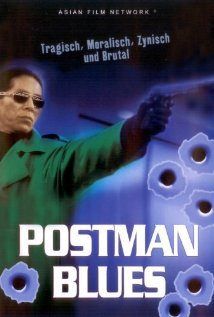Postman Blues
| Postman Blues | |
|---|---|
 Movie Poster | |
| Posutoman burusu | |
| Directed by | Hiroyuki Tanaka[1] |
| Written by | Hiroyuki Tanaka |
| Screenplay by | Hiroyuki Tanaka |
| Produced by |
|
| Starring | |
| Cinematography | Kuriyama Shuji[1] |
| Edited by | Kakesu Shûichi[1] |
| Music by | Daisuke Okamoto |
Production companies |
|
| Distributed by | Nikkatsu |
Release date |
|
Running time | 110 minutes[1] |
| Country | Japan |
| Language | Japanese |
Postman Blues (ポストマン・ブルース, Posutoman Burūsu) is a 1997 Japanese criminal action comedy-drama film directed and written by Hiroyuki Tanaka under the name Sabu. The film features Shin'ichi Tsutsumi, Keisuke Horibe, Ren Ohsugi and Kyōko Tōyama in the lead roles. It tells the story of a postman (Shin'ichi Tsutsumi) who is mistaken by the police as a criminal.
The film was released in Japan in 1997 and later in Italy in 1999 and Brazil in 2003. Hiroyuki Tanaka won the New Blood award at the 1999 Cognac Festival du Film Policier for the film.
Plot
[edit]Sawaki (Shin'ichi Tsutsumi) is a postman. He has an old friend Noguchi (Keisuke Horibe) who, unknown to him, had become a yakuza. Noguchi was being spied by the police for a long time. One day Sawaki delivers a letter to him and stays at his place for a while. During his stay Noguchi puts a package of drugs into Sawaki's letter bag. His finger, which he cut off as a symbol of loyalty to his gang, also accidentally falls into the bag. Viewing his relationship with Noguchi, the police think that Sawaki is a member of the yakuza and follow him. On reaching home, Sawaki finds a suicide note in his bag written by a cancer patient to her aunt. He rushes to the hospital to see the girl Kyoko (Kyoko Toyama) and falls in love with her. He meets a hit man Joe (Ren Osugi) there who tells him how he had won the contract killing competition called the "Killer of killers". The police profiler (Tomoro Taguchi), who was following Sawaki, comes to the conclusion that Sawaki is a member of the criminal gang. Meanwhile, Naguchi discovers that the finger he had cut was no longer in his house. All this marked the beginning of problems for Sawaki.
Cast
[edit]- Shin'ichi Tsutsumi as Sawaki
- Kyōko Tōyama as Sayoko Kitagawa
- Ren Osugi as Joe
- Keisuke Horibe as Noguchi Shuji
- Shimizu Hiroshi as Detective Domon Taizo
- Takizawa Ryoko as Ran
- Tomorowo Taguchi as Profiler
- Akaji Maro as Hanta
Reviews and reception
[edit]"Postman Blues is a film in which absolutely all the characters are so completely crazy that neutralize their absurd plans against each other and the film may find itself with sleepwalking to an end, which must appear in a very bizarre way as logical."
The film received mixed reviews from critics, but was hailed by some of them as one of the best works of Hiroyuki Tanaka.[4] The film was commercially successful and was declared a hit at the Japanese box office.[2] Cinematographer Kuriyama Shuji was praised for implementing the change of camerawork from high-action scenes to love scenes.[2] Japanese film critics praised the film by calling it "both a superb parody of the gangster genre and a masterful exercise in style and storytelling".[5]
The film received negative reviews from a few foreign film critics. Peter Bradshaw of The Guardian called the film a "chaotic Yakuza thriller, which has a lot of energy and pace, but is let down by uncertain, and slightly callow, undertones of comic sentimentality".[6] French critics said that "Postman Blues could have been an intelligent extension of his first film that surprised many people".[7] It was even called a disappointment[7] and an innocent black comedy.[8]
Home video release
[edit]DVD of the film was released by Asian Film Network.[2]
Awards
[edit]
| Award | Category | Nominee | Result |
|---|---|---|---|
| Bangkok Film Festival, 1998 | Audience Award for best feature film - Asian Cinema | Won | |
| Cognac Festival du Film Policier, 1999 | 'New Blood' Award | Hiroyuki Tanaka | Won |
References
[edit]- ^ a b c d e f Aaron Gerow. "Postman Blues". Kinema Club. Archived from the original on 26 November 2012. Retrieved 28 April 2014.
- ^ a b c d Detlev, Ross (December 14, 2007). "Postman Blues-Powermetal.de" (in German). powermetal.de. Retrieved 28 April 2014.
- ^ "Postman Blues-TV-critic.de" (in German). critic.de. 2 July 2009. Retrieved 28 April 2014.
- ^ "Postman Blues - Zelluloid.de" (in German). zelluloid.de. Retrieved 28 April 2014.
- ^ "Postman Blues". japansociety.org. January 28, 2011. Retrieved 28 April 2014.
- ^ Bradshaw, Peter. "Postman Blues (Posutoman Burusu)". theguardian.com. Retrieved 28 April 2014.
- ^ a b "Iken-eiga - Critiques du film - Postman blues" (in French). iken-eiga.fr. Retrieved 28 April 2014.
- ^ "Postman Blues (1997)" (in Norwegian). dvd-world.biz. Retrieved 28 April 2014.
